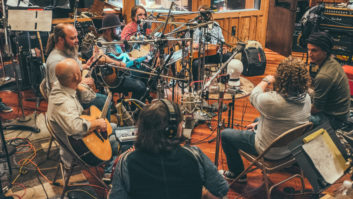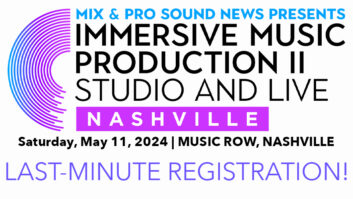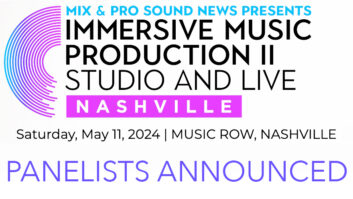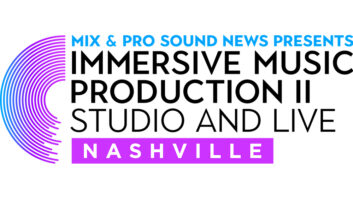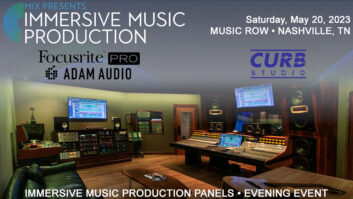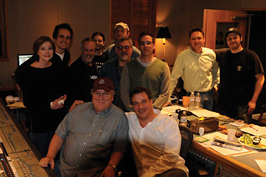
In Ocean Way Nashville: Bil VornDick (seated, left) and Marc Marshall. Standing, L-R: Nanci Griffith, Frank Lauber (co-producer), Peter Cronin (co-writer), Jacob Murray (assistant engineer), Thomm Jutz (co-producer, guitar), Pat McInenery (drums), Tim Lauer (keys), Mark Fain (bass), Morgan Hobbs (assistant engineer).
Photo: Jim McGuire
In Nashville, celebrities are often treated just like other human beings. Lyle Lovett can eat among the Pancake Pantry proletariat without being hassled for photos. Emmylou Harris can take in a Nashville Sounds ballgame and sign nary an autograph. Star sightings are frequent enough to inspire little in the way of fuss or freak-out.
This year, one of the celebs around Nashville was not only unmolested, he was completely unnoticed. Marc Marshall, whose huge baritone voice is normally heard within a German singing duo called Marshall & Alexander, is a regular presence on television and on major stages across Europe. Six albums of pop, semi-classical and other material have made Marshall & Alexander one of Germany’s most popular acts (insert David Hasselhoff crack here, if you must), and the uproar can be distracting when it comes time to make music.
“This is refreshing for me,” says Marshall sitting in the control room of Ocean Way Nashville’s Studio B, readying himself to sing the album’s only cover song, a duet with Nanci Griffith on her “Gulf Coast Highway.” Thomm Jutz, the German-born guitarist in Griffith’s Blue Moon Orchestra, co-produced the album with Marshall and musical director Frank Lauber, and Bil VornDick engineered. Laughing, Marshall surveys the room, and cracks, “My first country record.”
Marshall is joking about the country part. Waylon Jennings liked to quip that his pronounced twang meant he couldn’t go pop with a mouth full of firecrackers. Marshall’s operatic voice means he couldn’t go country with a mouth full of farm dirt. Jutz and his other collaborators didn’t try to force any kind of genre collisions, though the musicians in the room were certainly capable of playing in a style closer to their Tennessee homes. The record, which is likely to be released in the fall, is lush, yet decidedly organic. Most of the tracking was done in Studio B, through a Neve VRP 96-input console and recorded onto Pro Tools HD. Strings and horns were tracked in the 38×50-foot Studio A, with an enormous 80-input Neve 8078.
“The A room is a 100-year-old church,” said director of studio operations Pat McMakin. “And Studio B is a great, medium-sized tracking room with a wonderful Yamaha grand piano and a VR that’s heavily modified. It’s one of the best-sounding Neve VRs I’ve ever heard.”
Though Ocean Way Nashville was purchased by Belmont University in 2001 and students often work in a downstairs studio that is well separated from the A or B rooms, the environment at Marshall’s sessions was anything but academic.
“Ocean Way was built [by co-owners Gary Belz and Allen Sides, with significant contributions from acoustical contractor Michael Cronin and technician Sal Greco] to be a world-class studio, and the intention has not changed at all,” McMakin says. “I’m proud of the association with Belmont, and proud that students get a sense of what a professional environment is like. And in a declining studio environment, we’re able to keep this place right and keep the equipment well-maintained, in part because of our marriage with Belmont.”
Lately, Ocean Way has also been the site for sessions involving Faith Hill, Toby Keith, Kelly Clarkson, Marc Broussard and others.
Marshall sat with Jutz, Peter Cronin and Charlie Stefl and wrote the songs. Jutz and Marshall knew each other in Germany before Marshall’s career ascended to its current level. During tracking, Lauber often conferred with the singer in German about vocal technicalities, while Jutz worked with musicians (including banjo virtuoso Richard Bailey and Blue Moon Orchestra percussionist Pat McInerney) and VornDick manned the Neve.
“It was the right thing to have Frank here,” Jutz says. “He knows Marc’s voice well, and knows how far he can push him and when to hold back. VornDick worked his magic, and we just put a microphone in front of Marc and recorded what we got. We hardly did any overdubs on his vocals. And when we needed to work with the orchestra in A, we just took the hard drive and carried it down the hall. Both boards sound incredible.”
Most tracks came straight into the Neve consoles, though Marshall’s voice did go through a Martech preamp and a Universal Audio LA-3A audio leveler. In control room B, Marshall listened to a playback through the Ocean Way custom four-way L/C/R monitors. “That’s the way my voice sounds,” he says.
Marshall & Alexander often perform with large ensembles in a live setting, but the Ocean Way experience was a rare chance for the singer to work in real time with the players while in a studio setting. “In Germany, a singer is not a musician in the mind of a lot of the musicians,” Marshall says. “Here, it’s a different approach, and I am included in everything. I knew it would be right because I knew Thomm. He’s a great producer and a great guitar player, and after this record more people will realize that.”
Send Nashville news to skylinemix@live.com.
